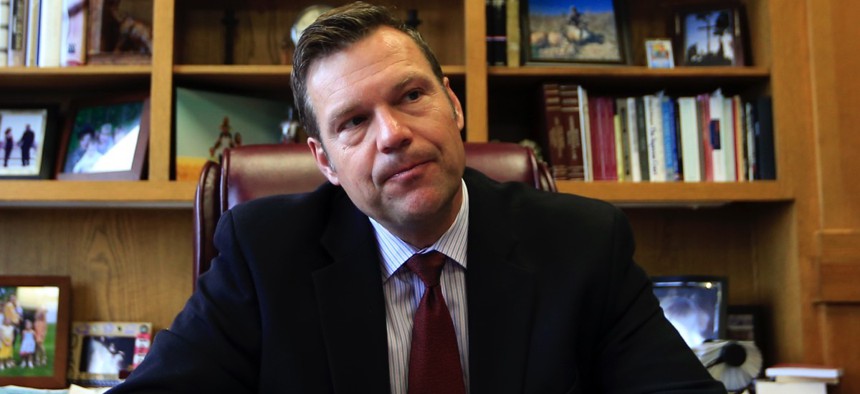Who Exactly Is Asking States for Voter Roll Data?

Kansas Secretary of State Kris Kobach Orlin Wagner / AP Photo
It's unclear who on the Presidential Advisory Commission on Election Integrity saw a letter demanding data from states.
WASHINGTON — The Trump administration’s Election Integrity Commission vice chairman, Kris Kobach, issued letters to secretaries of state on Wednesday requesting all their publicly available voter roll data including names, addresses, party affiliation and voter history. It is unclear whether anyone else on the commission had an opportunity to review the letter before its release or whether it was an official action of the commission.
Earlier that day, the commission held an “organizational” conference call where Kobach explained that he wanted to compare voter rolls state-to-state. While the letter was mentioned, it was framed as "certain letters would go out requesting certain data sets,” according to Maine Secretary of State Matt Dunlap, a Democratic member of the commission.
"We didn't read a draft," Dunlap said.
He explained that he suggested they should take great care in how the letter was worded, as voting officials are "very jealous guardians" of the sort of information they were requesting.
Dunlap said he understands why, since its release, some people took contention with the "tone of the letter," but the intent was "an interest in bringing together information on people in more than one jurisdiction.”
According to Dunlap's spokesperson, he received the letter "late" in the day on Wednesday, after the organizational call.
On the call where the letter was discussed, Indiana Secretary of State Connie Lawson asked if all members were required to sign the letter. Once it was made clear that only Kobach would sign the letter, the process moved forward.
According to Marc Lotter, press secretary for Vice President Pence, who serves as chairman of the commission, "no objections were raised" when the letter was discussed. He emphasized that "the letter was seeking information that is widely available in the public domain.”
In a contributed article for Route Fifty, David Becker, executive director and founder of the Center for Election Innovation & Research, argued that the publicly available data would be useless without the personally identifiable information that is not publicly available.
In an interview with Route Fifty, Becker said the information requested was essentially "a national file of all registered voters."
Obama’s former head of the Department of Justice’s Civil Rights office, Vanita Gupta, warned the letters to the secretaries of state do not bode well:
Connecticut Secretary of State Denise Merrill, a Democrat, agreed to share public information while withholding protected data. Merrill expressed skepticism as to what the commission is seeking and noted that Kobach’s “lengthy record of illegally disenfranchising eligible voters in Kansas” doesn’t exactly breed confidence:
Kobach has served as the elected secretary of state in Kansas since 2011.
Merrill serves as the current president of the National Association of Secretaries of State, and Lawson is the incoming president.
President Trump formed the Presidential Advisory Commission on Election Integrity via executive order in May, under the auspices of increasing voter confidence in elections but after claiming he only lost the popular vote because millions voted illegally. The commission includes six Republicans and four Democrats.
Elsewhere Thursday, the House Appropriations Committee moved to defund the U.S. Election Assistance Commission, tasked with helping states secure their election systems, at a time when cyber experts warn the threat of hacking is high.
The National Association of Secretaries of State, whose members are the top election officials in 40 states, two years ago passed a resolution opposing the commission out of fear it might infringe on their right to run elections.
U.S. Rep. Mike Quigley, an Illinois Democrat, offered a last-ditch amendment to preserve the bipartisan commission, but it failed during the markup.
“With foreign governments attempting to disrupt and influence our democratic process, now is the time to double down on our efforts to prevent all forms of election hacking—not eliminate the very agency on the forefront of this fight,” Quigley said in a statement. “EAC remains our nation’s best resource to protect voters’ rights and the integrity of elections, and plays a vital role as part of the Nation’s election system infrastructure.”
House Minority Leader Nancy Pelosi, a California Democrat, subsequently announced the formation of a Congressional Task Force on Election Security.
Rather than forensically analyze voting machines for evidence of cyberattacks in the 2016 election, following the U.S. Department of Homeland Security’s revelation Russia targeted elections-related systems in 21 states, President Trump’s administration has opted instead to concern itself with exceedingly rare voter fraud.
“The integrity of our democracy itself is under threat from the Russians. But we see an appalling absence of action, or even concern, from President Trump and Congressional Republicans,” Pelosi said in the announcement. “Democrats won’t allow Putin’s assault on American democracy to go unchallenged.”
Dave Nyczepir is a News Editor for Government Executive’s Route Fifty and Mitch Herckis is Route Fifty’s Senior Director of Programs.
NEXT STORY: USPTO building data reservoir





